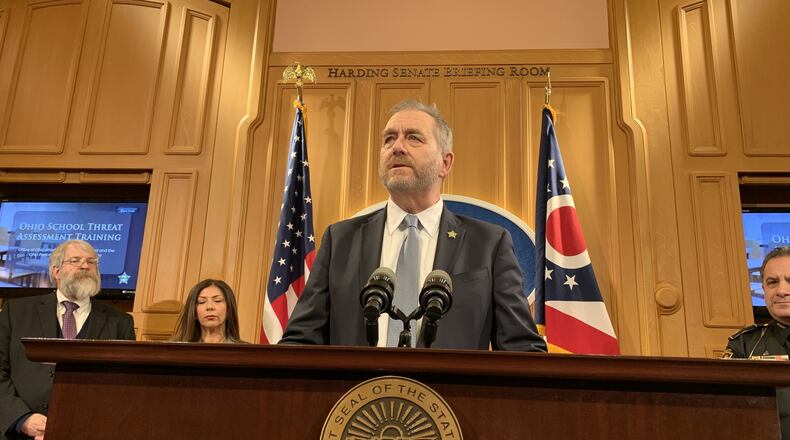RELATED: Realistic school shooter drills: Necessary or too traumatizing?
Broken into 10 elements, the free, online videos and a printed reference guide are available at www.ohioattorneygeneral.gov/threatassessment. An 11th episode available only to law enforcement will cover how to conduct a vulnerability assessment.
The goal is to assess and identify kids who might be in distress and get them help, said Lina Alathari of the U.S. Secret Service National Threat Assessment Center. It could be as simple as a teacher asking a student, “Are you okay? What’s going on with you?” Alathari said at Yost’s news conference at the Ohio Statehouse on Wednesday.
Like other states, Ohio has wrestled with how to protect schools against mass shooters, including fortifying schools, arming teachers and hiring police officers to walk the halls.
RELATED: Lawmakers consider bill to reduce youth suicides, improve school safety
Yost said he doesn’t know how many Ohio school districts currently have threat assessment teams in place.
In October, the Ohio House voted 85-7 in favor of House Bill 123, which would require school districts to establish a threat-assessment team and contract with an anonymous reporting system that operates 24/7 to receive safety tips and report the tip data to state officials. Districts would also be required to train employees and teach students in sixth through 12th grades social inclusion, violence prevention and how to identify the signs of depression, suicide and self-harm.
State Rep. Gayle Manning, R-North Ridgeville, sponsor of the bill, said she expects the Ohio Senate to take action on it after the March 17 primary.
School shootings in the region include a student bringing a gun to Madison Junior/Senior High School in Butler County in 2016 and wounding four classmates; a 17-year-old student bringing a shotgun to West Liberty-Salem High School in Champaign County in 2017 and wounding one classmate; and a student taking a gun to Dennis Middle School in Richmond, Indiana, in December, exchanging gunfire with police before taking his own life.
Ohio’s deadliest school shooting occurred in 2012, when three students were killed at Chardon High School.
In August, Dayton Daily News and other media outlets filed suit against Bellbrook Sugarcreek Local Schools to release student records of Connor Betts, the mass shooter who killed nine and injured 27 people in the Aug. 4 Oregon District shooting. Yost filed a brief supporting the media outlets. The Ohio Supreme Court is considering the case.
The district argues that privacy laws prevent the release of the records.
Yost said on Wednesday that releasing Betts’ records might help inform responses to future threats.
“The fact of the matter is, the more we know, the more we understand about these kinds of incidents, the more we can think about how does that intervention work,” Yost said. “This is a critical public safety issue — aside from the fact I don’t understand how a right of privacy can survive an individual’s demise.”
About the Author

